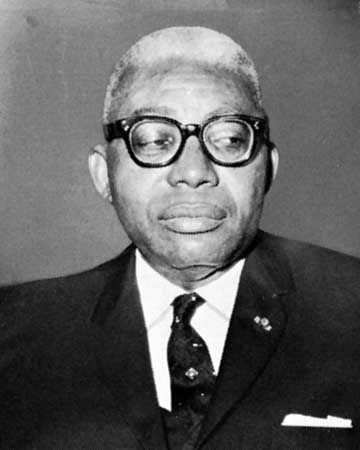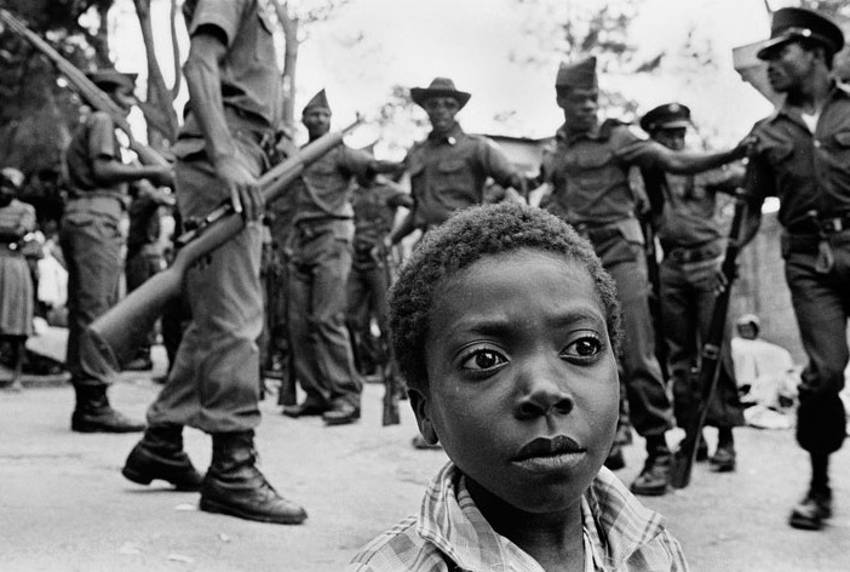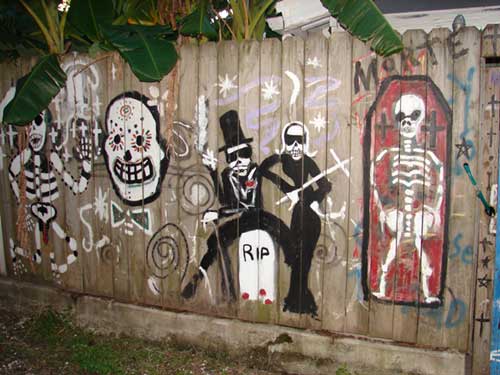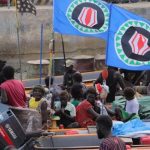Papa Doc is name that stills the people of Haiti with dread. Between 1957 and 1986, the nation of Haiti was ruled by one family, the Duvalier family. After an emergence as leader in democratic elections in 1957, François Duvalier, later to be known as Papa Doc, increasingly became known for totalitarianism and barbarism. After dying in 1971, he was replaced by his son, Jeane-Claude Duvalier, known colloquially as Baby Doc. At last in 1986, a popular uprising ousted Jeane-Claude, forcing him to flee the country and ending the decades of rule. So that’s the basic history summary. But now the real meat of the matter. Who exactly were they?

Papa Doc
Pre-Presidency of Papa Doc
François Duvalier was born in 1907 and for his early life, by most accounts, was a pretty nice guy. He studied in America to become a physician and through the 1930s and 40s, he was active in many campaigns to help fight infectious tropical diseases in his home country. The feared and largely ironic name ‘Papa Doc’ was at this time totally sincere, being the nickname his patients gave him for all his hard and caring work.
Duvalier wasn’t all about the medicine. Between March and July of 1915, Jean Vilbrun Guillaume Sam led Haiti as a dictatorship culminating in the July execution of over a hundred imprisoned political opponents. In direct response to this, the people immediately rose up and lynched the dictator. Unfortunately, this particular Haitian dictator happened to be an ally of the United States, who much preferred their ‘allies’ to be stable and very much in their pockets. An American invasion began the very next day, putting down the rebellion by November.
American interests were ostensibly to return the island to peace and democracy, though this had never been the intentions. Even before the intervention, the sole bank in Haiti was American owned and Haiti’s gold reserves had been moved to America the previous year. With this incursion, America found itself with the opportunity to twist things even further in their favour with a layer of plausible deniability, president Woodrow Wilson particularly wanting to secure a constitutional amendment to allow foreigners to own Haitian land. Approximately 40% of the Haitian economic output was turned over to repay US and French banks that had previously granted Haiti loans and the country’s administration became overseen by American advisors.
Racism, arbitrary detention and murder along with general imperialism soured the attitudes of Haitians greatly and was to be a major influence on Duvalier. In response to the extreme racial prejudice expressed by their colonial rulers, many Haitians began to express strong national and ethnic pride in defiance, something that Duvalier picked up on strongly. Notable was the strong upholding of traditional Haitian culture and tradition, with vodou (or voodoo) being strongly advocated by many, including Duvalier.
The last American forces departed Haiti in August of 1934, though control of Haiti’s external finances continued right up to 1947. Even with the withdrawal, American influence was sharply felt in the restructuring of Haitian society, from their education system right up to their leaders, who were now typically made up of a wealthy, ‘Americanised’, mixed-race elite. The Haitian populace were increasingly hostile to this system, which is where Duvalier found his political opening.
Owing to his popular support for traditional Haitian culture and pan-African ideals, Duvalier became immensely popular in his native country and was made Director General of the National Public Health Service in 1946. In 1950, a military coup replaced the president with a new dictator and Duvalier quit his position in protest to return to practicing medicine, once again boosting his political clout with the public. By 1956, Duvalier, by now in hiding from the new regime, publicly announced his intention to run for president. Facing massive public opposition, the new dictator conceded defeat and an election was called.
For the 1947 election, Papa Doc Duvalier’s opponent was Louis Déjoie, a mixed race industrialist and landowner. Running under a populist platform of specifically Afro-Haitian nationalism, the minority mixed race Haitian population was isolated and Duvalier won the election by a large landslide. Under promises to rebuild and renew the country, the initial feelings at this time were likely very positive. At last, a Haitian leader of the people who would improve things for the people! What could go wrong?
Presidency of Papa Doc

Totalitarianism started up pretty quickly under Papa Doc. Political opponents were exiled and the constitution saw re-writes to grant further power. Positions of power were soon filled by Afro-Haitians, further consolidating his core support base. While a great many Haitians were likely willing to accept these ‘minor’ abuses of authority, things began to change following an attempted coup in July of 1958. This incident heightened Duvalier’s distrust of the military, prompting him to purge the military command and install loyal patsies who’d gladly obey his every command.
By 1959, this control over national security expanded further with the formation of the Militia of National Security Volunteers. This apparent popular people’s militia soon became known by the affectionate nickname of ‘Tonton Macoute’, the popular Haitian Creole equivalent to ‘bogeyman’. This militia expanded to over twice the size of the standing army, acting as Duvalier’s personal army and secret police, exercising power particularly in the countryside where military strength was weaker.
Key to what came next was a 1959 incident where the president suffered an enormous heart attack. After nine hours spent in a coma, it was believed that he may have suffered significant neurological damage from the incident. Evidence first became apparent through his paranoia during recovery. Since a man who’d just spent half a day near-dead with a malfunctioning heart isn’t necessarily fit to manage a nation, the leader of the loyal Tonton Macoute was left in charge while Duvalier recovered. Rather than showing appreciation for a loyal stooge keeping the proverbial seat warm, ‘ol Papa Doc had the man imprisoned for an alleged plot to overthrow him. In what may have been the last altruistic move by the president, the would-be not-really coup-plotter was released from prison and went on to… Start to orchestrate an actual coup.
The coup failed and the man fled into hiding, with one of Duvalier’s staff informing him that the man had transformed into a black dog upon fleeing. Perhaps the first real indication of his growing mental instability was the order to then have all black dogs in the capital killed on sight. From here, what was merely a regular ‘ol tyrannical dictator began to spiral into something much stranger and more unhinged.
Now, there’s certainly an argument to be had that what we’ve considering unhinged is merely a cultural difference. The man believed in vodou, as many Haitians did and there’s nothing inherently wrong with that. The idea that he believed an opponent could change into a black dog is perhaps peculiar and unexpected, but it’s not necessarily an indication of mental instability. What came later is much less open for interpretation in this way.
Papa Doc’s Brutality

At the start of his presidency, Duvalier was content to send his opponents into exile or arrest them temporarily. After this coup and the harm of his heart attack, things began to take a much darker turn. Taking a further tip from his vodou interests, the president ordered on at least one occasion that executed rebels have their heads brought to him so he could commune with their spirits. While the vodou itself can be chalked up to native culture that perhaps seemed normal from an insiders perspective, actively beheading your enemies to use vodou as a military strategy is very much still unusual. From this willingness, it was hardly a leap to move to outright torture.
It’s alleged that the president liked to watch torture through peep-holes in the wall, or even just standing in the room as it occurred. From the usual beatings, shockings and stabbings to more ‘exotic’ dips in acid baths, the Haitian state had become a terrifying torture apparatus to retain control. The increasingly erratic, paranoid and unhinged attitudes of its leader meant that few people were assured safety. By the end of the regime, an estimated 60,000 had been executed out of a population of around 7 million. (At the time the research was conducted anyway.)
Attempts to secure control became more blatantly fake. The 1964 referendum to decide on naming Papa Doc president for life came out at an ‘impressive’ 99.9% approval, highlighting the sheer gall of the government and contempt for both domestic and international observers. Money was increasingly misappropriated by the president for both his personal gain and to ensure the loyalty of his enriched inner circle of goons.
Perhaps most useful to the dictatorship was the assassination of JFK in America (an act that Papa Doc claimed credit for, claiming to have put a curse on the president). JFK had hardly been a supporter of Haiti, but the new American regime saw some use in Duvalier’s strong anti-communist credentials. In return for joining in sanctions on Cuba and cracking down on native leftists, US pressure on the Haitian state reduced.

Tapping into his vodou credentials again, Papa Doc declared himself a vodou priest and modeled himself quite deliberately on Baron Samedi, the spirit of Death in Haitian vodou. Not willing to discard the large Christian growth within the country, he tried to appeal to both at once by declaring himself ‘one with the loa (spirits), Jesus Christ and God himself.) Duvalier became a quasi deity, drawing upon both traditional Haitian culture and Christian faith, much to the chagrin of the Catholic Church and other such institutions.
Papa Doc Dies

So what blaze of glory did this man go down in? Was he slaughtered in a popular uprising? Gunned down in a coup? Nah. Life is less interesting. A mixture of health problems ultimately felled the vodou king on the 21st of April 1971. His 19 year old son was appointed as his successor as part of his whole ‘president for life’ thing. In such a tumultuous time, one would think that this was the perfect opportunity for revolution or at least a coup, but alas this was not to be the case for Papa Doc.
For all Duvalier’s vicious brutality, he was still highly popular among much of his base. While he did shift large amounts of the country’s wealth to his personal accounts and those of his stooges, a substantial portion was used to develop infrastructure such as schools and hospitals. With this being primarily directed at the historically neglected Afro-Haitian majority, the policies made him very popular among the more traditionalist, non-leftist section of the Afro-Haitian populace. So long as his son could continue along that path, people were willing to cross their fingers and hope for the brutality to step back.
Baby Doc

I’ll be brutally honest here. Baby Doc is fucking boring. Duvalier is, at the very least, a fascinating character study in mounting egotism, potential madness and traditional Haitian culture blended together into one dictator.
His son though lacked the aspects that are as fascinating in retrospect, while also not being any substantial upgrade. It would be one thing if Baby Doc were a better man altogether, but he simply wasn’t. Aside from some minor reforms, the releasing of a few political prisoners and the lapsing of the more religious side to the cult of personality, little changed about the character of the Duvalier-led Haitian state. In essence and much like other dictators he had grown up with this as all he knew, rather than “earning” his leadership as Papa Doc did, to an extent.
Being a 19 year old, expectations were already tempered for Baby Doc’s ability to lead the nation. Tempered, it seems, by himself who wished for his older sister to take charge, but these were not the times for female leaders. Without the want, or ability, responsibility was instead delegated to various ministers and his mother (Mama Doc, naturally) while the man himself gorged himself on stolen national wealth and a hedonistic lifestyle. Much of the moderate development seen under his father stagnated as finances became increasingly allocated to cronies, in actual fact being much worse than his father Papa Doc as he literally had no interest in looking after the Haitian people.
Baby Doc could not command the public support his father had. Through both genuine support and fear, Duvalier consolidated a strong support base in the Afro-Haitian populace, while Baby Doc increasingly squandered the image of the dynastic regime. A lavish wedding between himself and a notably mixed-race woman ran into the millions of dollars and further cemented a rift between himself and the support base his father had established. The outright hedonism on display in the presidential palace soon tricked down to the populace, who were by this point struggling from a series of disasters plaguing the country. An outbreak of African swine fever had decimated food sources for many, while the growing corruption, ineptitude and stagnation had exacerbated problems, leading to malnutrition and borderline famine in much of the country.
In March 1983, the doomed state of the nation seemed secured by a visit from the Pope, who rather openly called for regime change. By relaxing censorship but not the character of the state apparatus, Baby Doc had opened wide the doors for himself to be ousted by a popular uprising. Between late 1985 and early 1986, these issues culminated in localized uprisings that soon spread through Haiti, with a disorganized and half-hearted response only emboldening the resistance. With the assistance of then-US president Ronald Reagan, Baby Doc and his family fled the nation in February of 1986, finding refuge in France.
The end of Baby Doc

Living in exile in Paris, the continued lavish lifestyle of Baby Doc and his wife further angered the native Haitian populace who declared that he would be arrested upon arrival if he was to return. In the years that followed, he soon separated from his wife and lost a substantial portion of his wealth. With decades passing, much of the true hatred faded and a small portion of Haitians became nostalgic for the Duvalier era. Coupled with the increasing emptiness of Baby Doc’s financial coffers, a long period of exile was finally met by a return in January of 2011, with Baby Doc returning to his beloved homeland for ‘reconstruction’ and definitely not the $4 million in frozen Swiss bank account assets that he could retrieve there.
Two days later, Baby Doc was arrested and charged with a litany of crimes, with corruption and misappropriation of funds being the main charges. Surprisingly, he was merely kept under loose house-arrest while court proceedings continued, living in relative luxury while the slow legal process drew out. It was only in February of 2013 that he finally appeared in a courtroom to plead ‘not guilty’ to the crimes alleged of him. At last by October of 2014, Baby Doc died of a heart attack without ever seeing the inside of a prison cell.
Despite the corruption and brutality, Baby Doc and even Papa Doc were fondly remembered by some, particularly notable as Baby Doc touched down in Haiti to cheering crowds. Why? Well, considering the extremely unstable post-Duvalier governments and the catastrophic Haitian earthquake of the previous year that killed between 1-2 hundred thousand people and devastated infrastructure, many Afro-Haitians in particular likely missed a sense of stability and gradual economic growth, even if much of their natural wealth was being robbed from them. This honeymoon period appears to have not lasted long, with the former Duvalier political party collapsing entirely in elections, shifting from total national domination during the Duvalier rule to a measly 0.06% (929 votes) in 2015.
Is it Papa Doc to blame for Haiti’s current woes in 2022
Haiti is once again in serious trouble and is asking for international assistance . This of course though is not new with Haiti essentially being a failed state. The irony is that after the USA Haiti was the second country to get independence, so even colonialism cannot truly be blamed.
And also in reality Papa Doc is not only not to blame for the current woes of Haiti, but there are even people that miss the perceived stability of the Papa Doc era. How truly this is up for debate, but it is interesting how people often miss dictators like Papa Doc.
If yoDoc to blame Haiti being such a mess?u find the history of Haiti and its modern existence as interesting as we do, you should consider coming along on our July tour!





